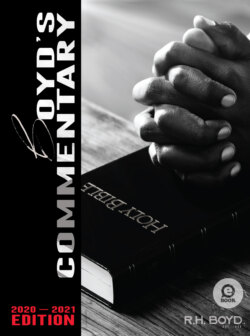Читать книгу Boyd's Commentary - R.H. Boyd Publishing Corporation - Страница 63
На сайте Литреса книга снята с продажи.
EXPOSITION I. THE QUESTION OF OUR ETERNAL LIFE (LUKE 10:25–29)
ОглавлениеVerse 25 opens with a question for Jesus from a lawyer in the crowd. While the occasion is unknown, it easily can be inferred Jesus was teaching a small group of people. This lawyer stood out in the group as a man with excellent religious credentials, one who studied God’s law continually to interpret it for the people who desired to obey it. He had garnered respect among the people as an expert in the law. When he asked Jesus what he must do to inherit eternal life, it was clear he was seeking validation more than an answer to his question. The text shows the lawyer’s motivation was malevolent. The word used is εκπειραζω (ekpeirazo). It comes from the word πειραζω (peirazo) meaning “to trap, test, or tempt.” This same family of words is used in the narrative of Satan’s temptation of Jesus. This man stood as an emissary for the devil.
Beyond being an attempt to trip up Jesus, the lawyer’s question was not a very good question. Noted New Testament scholar Amy-Jill Levine in her book Short Stories by Jesus points out that the language used by the lawyer indicates he wanted to do something to gain possession of eternal life, as if one might earn the gratuitous gift of God. Secondly, he asked what he could do to inherit eternal life. To inherit something is to gain by possession something that is owned and/or controlled by the future possessor. Eternal life is not to be possessed or gained. It can only be participated in.
Jesus, knowing the lawyer’s true intent, created an opportunity for the lawyer to flaunt his expertise. Rather than answering his question directly, Jesus bounced it back to him and asked, “What is written in the law?” (10:26, NRSV). Given he was an expert of the law, Jesus invited him to share his interpretation or his reading of it. As expected, the lawyer answered by quoting the most sacred law in Judaism—Deuteronomy 6:5. Known as the Shema, this law is both a prayer and a law because it is upon this prayer that all the Law of Moses rests. A devout Jew would pray it twice each day. It consists of three prepositional phrases that describe the total response of love toward God: the heart (emotions), the soul (consciousness), and strength (motivation). Further validating his answer, the lawyer also quoted Leviticus 19:18 (NRSV), “You shall love your neighbor as yourself.” Agreeing with the lawyer’s answer, Jesus told him, “Do this, and you will live” (Luke 10:28, NRSV). To justify himself as a pious Jew in front of Jesus and the surrounding crowd, the lawyer further asked, “And who is my neighbor?” (10:29, NRSV).
This was the problem with the lawyer. He wanted to justify himself or appear righteous. Justification is a gift that comes only from God. As he attempted to justify himself, he dug a deeper hole that would be harder for him to get out.
